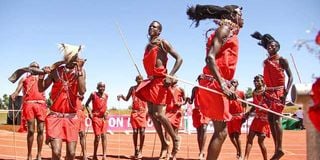Immense soft power potential in Kenya’s rising cultural diplomacy

Maasai traditional dancers entertain guests at a public event in 2014.
It has often been argued and maybe rightly so, that culture is the window to the soul of a nation. It is, therefore, quite understandable that culture is emerging as a powerful tool for international diplomacy.
It did not start recently. When, in 1934, the British Council was established, it was a deliberate initiative to create an institution that would promote a greater understanding of British culture among nations with a view to softening the ground for government-to-government diplomatic engagements.
The French followed suit with Alliance française, the Germans with Goethe-Institut and the Chinese with the Confucius Institute.
These, and similar initiatives by other key global players, have led to the rise of cultural diplomacy as a key plank of international relations as nations seek to be understood better through the window of their cultures.
Given our history as a nation founded on the coming together of many cultural subnations, Kenya is today a cultural mosaic—a nation with a rich cultural diversity comprising close to 50 distinct and colourful cultures.
And, so far, we have witnessed cultural festivals promoting some of this diversity. Lamu Cultural Festival, which showcases Swahili culture, Maragoli Cultural Festival, celebrating Lugooli and Maragoli culture in general, and Turkana Cultural Festival are among the cultural events that have stood up to be counted.
Besides the role that they play in the promotion of our tourism, we now also need to begin to package these cultural fetes as effective instruments of cultural diplomacy, bridges between us and the nations of the world in very much the same way that events like The Rio Street Carnival and the Edinburgh Cultural Festival have done for Brazil and the United Kingdom, respectively.
Diplomatic soft power
When it comes to using culture to build Kenya’s diplomatic soft power capabilities, the best weapon in our arsenal is, without a doubt, Maasai culture. Very few African cultures can claim the fame and universal appeal that the Maa culture has earned itself locally and internationally over the years.
It is because of this strong name recognition that it is possible for one to find a high-end clothing shop in Copenhagen, Denmark, called Maasai, or a highrise apartment block in Iowa, USA, called Maasai Heights or, for that matter, a street vendor in Istanbul, Turkey, selling a T-shirt with the inscription “ I Did not Choose to be Maasai: I Just Got Lucky”!
This is clearly strong brand recognition which the country must build upon.
The Maa cultural brand has been on the ascendancy for the past 100 years. Indeed, for those who keep tabs with cultural history, this year marks the 140th anniversary of the arrival of the red Maasai shuka that has become synonymous with being Maa.
Ever since the Scottish explorer Joseph Thomson delivered the shuka to the Maasai in 1883, the community has appropriated it as its own; modified it, and embellished it with beads and art to become the colourful Maasai dress that is now the preferred cultural robe for many, including outside the community itself.
The dress, the vertical Maasai dance, as well as key rites and rituals of the community, have become the highlights of their culture. It is no coincidence that Unesco has classified three Maasai rites and ceremonies—Enkipaata, Eunoto and Olng’esher—as World Cultural Heritage.
It is worth our effort in time and money as a country to invest in the further development of this important cultural asset. It is, for this reason, the Ministry of Foreign Affairs has partnered with the organisers of the upcoming Maa Cultural Festival to ensure that it is successful and brings glory to Kenya.
The inaugural Maa Cultural Festival is slated to take place in August. This also happens to be the climax of the wildebeest migration—a truly apt coincidence because we shall be celebrating the culture of a people whose reverence for nature and conservation bequeathed the migration to mankind. The wildebeest migration spectacle is, itself, classified as the 8th Wonder of the World!
Today, together with the organisers of Maa Fest 2023 and other key stakeholders across all sectors, we congregate to flag off the process towards the actualisation of the noble project of the Maa Cultural Festival.
Without a doubt, the festival will be a showstopper—a weeklong cultural bonanza and an important milestone in the evolution of our cultural diplomacy.
Dr Sing’oei is the Principal Secretary, Ministry of Foreign Affairs. [email protected].




